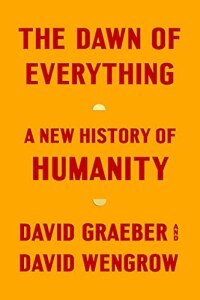The Dawn of Everything, by David Graeber and David Wenbow

This is a classic example of the genre of “I listen to a long audiobook about a really in-depth subject I know very little about.” I don’t understand everything I hear and probably retain even less than I understand — audio format would not be ideal if I were trying to learn this material for a practical purpose — but the point for me is that it’s an easy way to expose myself to some new ideas and information while I go about my daily business of driving, washing dishes, walking the dog, or doing any other activity that I can do while listening to an audiobook.
This one is about the development of human culture in prehistoric times, and how a lot of the assumptions we have had about what pre-literate cultures were like are probably completely wrong. The authors touch on some of the myths, like the popular idea of a simple, egalitarian, almost Edenic hunter-gatherer period superseded by the dawn of “civilization” coming along with the development of agriculture and cities, leading to a loss of individual freedom as rulers and state structures took over. They argue that things in prehistoric times were actually a lot more complex than that, that centralized states were not an inevitable outcome of agriculture, and that rather than being subjected to a sort of inevitable “march of evolution,” ancient peoples actually made choices about the kinds of government they had, and those choices weren’t always what we’d expect.
The relevance of this for the present world, they argue, is that we find ourselves “stuck” in societies with tremendous inequality and find it nearly impossible to imagine different ways of conducting our affairs — so perhaps we have something to learn from more “primitive” peoples.



